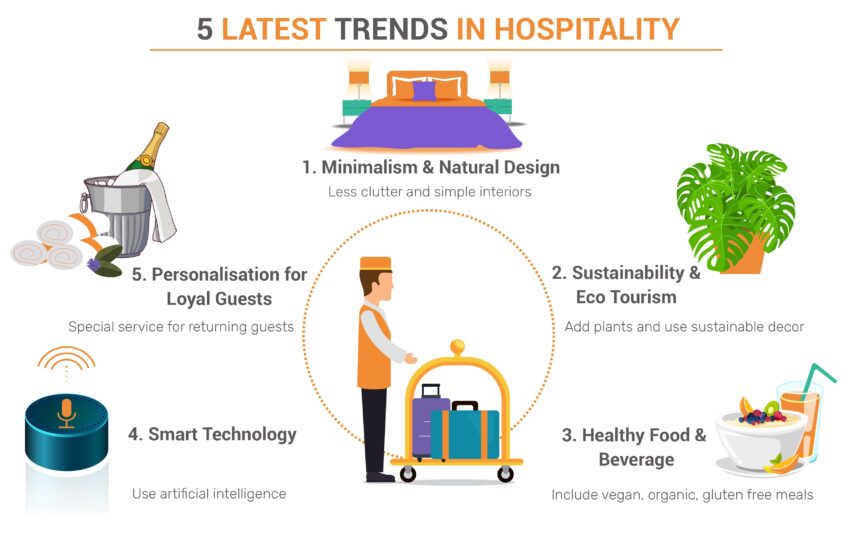In an era where environmental consciousness is on the rise, the hospitality industry is taking significant strides towards sustainability. Hotels and hospitality businesses are recognizing the importance of adopting eco-friendly practices to minimize their environmental impact. This article explores sustainable practices that hotels can implement to contribute to a greener and more responsible future.
Renewable Energy Sources
Transitioning to renewable energy sources, such as solar or wind power, is a pivotal step towards reducing the carbon footprint of hotels. Installing solar panels on rooftops or utilizing wind turbines can significantly lower energy consumption.
Energy-Efficient Lighting
Replacing traditional incandescent bulbs with energy-efficient LED lighting not only reduces energy consumption but also extends the lifespan of lighting fixtures, leading to long-term cost savings.
Smart HVAC Systems
Implementing smart heating, ventilation, and air conditioning (HVAC) systems that automatically adjust based on occupancy and external weather conditions helps optimize energy use and enhance overall efficiency.
Low-Flow Fixtures
Installing low-flow faucets, showerheads, and toilets in guest rooms and common areas reduces water consumption without compromising guest comfort, contributing to water conservation efforts.
Linen and Towel Reuse Programs
Encouraging guests to participate in linen and towel reuse programs not only minimizes water and energy usage but also reduces the volume of laundry, lowering associated environmental impacts.
Rainwater Harvesting
Hotels can implement rainwater harvesting systems to collect and store rainwater for non-potable uses, such as irrigation and landscape maintenance, promoting sustainable water management.
Source Segregation
Implementing source segregation practices for waste disposal encourages proper sorting of recyclables, compostables, and general waste. This ensures that materials are sent to appropriate facilities for recycling or responsible disposal.
Single-Use Plastic Alternatives
Eliminating or reducing the use of single-use plastics, such as plastic straws and packaging, in favor of biodegradable or reusable alternatives aligns with sustainability goals and reduces plastic pollution.
Food Waste Management
Implementing strategies to minimize food waste, such as offering smaller portion sizes, donating excess food to local charities, and composting organic waste, contributes to a more sustainable and socially responsible operation.
Green Building Certification
Seeking green building certifications, such as LEED (Leadership in Energy and Environmental Design), demonstrates a commitment to sustainable building practices, including energy efficiency, water conservation, and indoor air quality.
Natural Lighting and Ventilation
Designing hotels with ample natural lighting and ventilation reduces the reliance on artificial lighting and HVAC systems, contributing to energy savings and creating a more pleasant guest experience.
Sustainable Materials
Choosing sustainable and locally sourced materials for construction and interior design minimizes the environmental impact associated with transportation and supports local economies.
Local Sourcing for Food and Amenities
Supporting local farmers and businesses by sourcing food and amenities locally not only reduces the carbon footprint of transportation but also contributes to the economic development of the community.
Community Partnerships
Establishing partnerships with local organizations and engaging in community projects, such as conservation initiatives or educational programs, demonstrates a commitment to social responsibility and community well-being.
Employee Training and Well-being
Providing training for staff on sustainable practices and promoting employee well-being through initiatives like health and wellness programs fosters a positive and socially responsible workplace culture.
Shuttle Services and Bike Rentals
Offering shuttle services or bike rentals for guests encourages the use of sustainable transportation methods, reducing the environmental impact of individual car travel.
Electric Vehicle Charging Stations
Installing electric vehicle (EV) charging stations in hotel parking lots supports the growing trend towards electric transportation and accommodates eco-conscious guests with electric vehicles.
Eco-Certifications
Seeking and obtaining eco-certifications, such as Green Key or EarthCheck, enhances the credibility of hotels as environmentally responsible establishments, attracting eco-conscious travelers.
Guest Education
Providing information to guests about the hotel’s sustainable practices and encouraging them to participate in eco-friendly initiatives enhances awareness and promotes a culture of responsible tourism.
Conclusion
In conclusion, sustainable practices in hotels and hospitality businesses are not just about environmental responsibility; they contribute to operational efficiency, cost savings, and enhanced guest experiences. By adopting energy-efficient measures, implementing water conservation initiatives, reducing waste, engaging with local communities, and prioritizing sustainable transportation, hotels can play a crucial role in shaping a more sustainable and eco-friendly future for the hospitality industry. As travelers increasingly prioritize sustainability, hotels that embrace these practices are not only fulfilling their environmental duties but also appealing to a growing market of conscious consumers.

